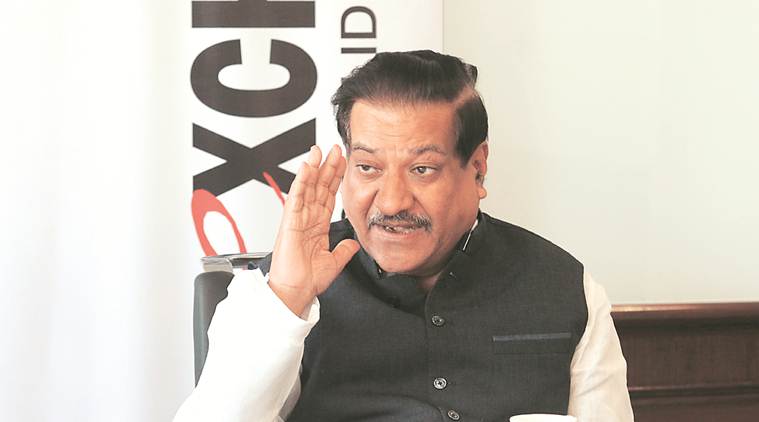 Predicting an alarming situation ahead, Chavan said the government will have to make higher allocations at the cost of increased fiscal deficit.
Predicting an alarming situation ahead, Chavan said the government will have to make higher allocations at the cost of increased fiscal deficit.
Former Maharashtra Chief Minister and senior Congress leader Prithviraj Chavan on Monday said Prime Minister Narendra Modi government’s Rs 1.7 lakh crore relief package for the poor who have been hit hard by the lockdown was very little.
“Other countries have loosened their purse strings for their people. The US’s first financial stimulus package was $2.2 trillion,” he pointed out, at the web interactive series “Sathicha Gazhal Maharashtracha”, organised by Loksatta.
Chavan believed the problem with the Modi government was lack of consultation, especially on the economic front. Chavan, who has served as a Union minister, recalled, “Former Prime Minister Manmohan Singh had an economic advisory council. As an economic expert, he was very well-versed with the nuances and challenges. But he would still hold adequate discussions and accept recommendations from the council. Unfortunately, one is not very sure to what extent the Modi government allows consultations.”
Predicting an alarming situation ahead, he said the government will have to make higher allocations at the cost of increased fiscal deficit. “‘Helicopter money’ is mandatory. And greater borrowing from RBI for loans and not expenditure as witnessed in developed countries should be considered. The government will have to bring an economic model to tackle the challenges arising from COVID-19, including inflation, industrial slowdown and unemployment,” he said.
“The prime minister, who has earned the tag of giving shocks through sudden announcements as witnessed in case of demonetisation or GST, will not work. Instead, decisions taken with consensus and consultations will work,” he added.
Asked if he would equate the present functioning of the Centre to an “economic emergency”, Chavan said, “To some extent, it is evident whether it relates to employees’ salary cuts or PM Care Fund — all decisions rests with the PM. There is no explanation nor clarity on who would audit the funds and monitor how it is spend. In some way, Modi’s functioning is modelled on the Presidential form and personality-oriented.”
On the difference in style of working between Manmohan Singh and Narendra Modi, Chavan said, “I was part of the Singh government where every decision was taken after consultation and consensus. My information about Modi’s style of working is from hearsay. But what emerges is, Modi has made the role of Union cabinet or advisory councils less significant. This is not good. After all, there are many bright minds with lot of experienced IAS officers or meritorious academics whose advice cannot be ignored. I believe the present PM does not need any advice.”
Chavan also described Modi’s decision to start a bullet train between Mumbai and Ahmedabad or GIFT City or IFSC Authority’s head office at Gandhinagar as extremely narrow and home state-centric. “From Gujarat CM he landed in Delhi as PM. So, in every decision Gujarat was a dominant factor. Whereas, if we look at former PMs like Chandra Shekhar or Deve Gowda, they took a broader view, having worked in Parliament and in Delhi,” he said.
“Taking lessons from Covid-19, it is now the imperative of the government both at the Centre and state to focus and make higher allocations on ‘soft infrastructure’. In the field of education, health and environment, we have to make higher budgetary allocations. These should become priority sectors,” he said.
While regretting that during his tenure as Maharashtra CM, he could not concentrate as he would have liked to on these three critical sectors, Chavan said, “The emphasis on hard infrastructure like construction of roads, bridges, airports etc also stem from populist politics. In a democratic set-up, elected members often push for hard infrastructure as it helps them show results.”
“Yet, hereafter the country cannot afford to ignore the health, education and environment sectors,” he said.
“Governments have to prepare themselves to co-exist with Covid-19 amidst apprehensions of a possible second wave. And, therefore, ensuring smooth supply chains and reviving industrial units remain a formidable task,” he added.
Indicating that the three-party coalition was working smoothly in Maharashtra, Chavan said, “Setting up a coordination committee with representatives from the Congress, NCP and Shiv Sena, which would be outside the government and provide guidance, would have been a greater help. After the lockdown it can be discussed.”